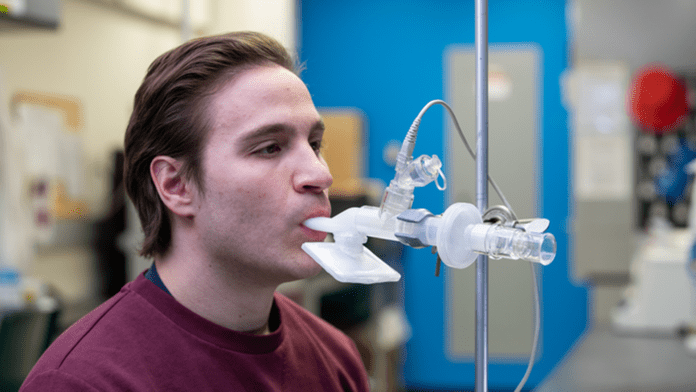
Research conducted at McMaster University has identified that inhaled aerosol vaccines may provide more potent and longer-lasting protection from infectious diseases than nasal sprays.
Nasal spray vaccines predominantly target the nose and throat and have emerged as a non-invasive delivery method for protecting against various diseases. However, a McMaster University study suggests that inhaled aerosol vaccines can effectively bypass the nasal passage, administering vaccine droplets deep in the airway where they elicit a broadly protective immune response that is more effective than nasal vaccines.
The findings, which are published in the journal Frontiers in Immunology, may help inspire future vaccine design, pioneering novel delivery methods to safeguard the population from infectious diseases.
Current vaccine design
During the COVID-19 pandemic, more than 6.3 million people lost their lives due to the SARS-CoV-2 virus, with respiratory infections remaining a substantial cause of illness and death worldwide. COVID vaccines significantly reduced the burden of the disease, resulting in a global effort to design vaccines that can be directly delivered to the mucous lining of the respiratory tract.
Nasal flu vaccines are highly effective in children but far less in adults, meaning injectable flu vaccines are the predominant choice for seasonal flu vaccinations. However, their invasive nature can lead to vaccine hesitancy as some people fear needles.
Innovating inhaled aerosol vaccines
To analyse delivery methods, the researchers utilised a tuberculosis vaccine and measured the distribution of droplets, immune responses, and potency in animals. The team observed that when the vaccine was delivered directly into the lungs as an inhaled aerosol vaccine, it achieved stronger immune responses and provided significantly better protection from the disease.
Matthew Miller, a study co-author who holds the Canada Research Chair in Viral Pandemics at McMaster University, commented: “Infections in the upper respiratory tract tend to be non-severe. In the context of infections caused by viruses like influenza or SARS-CoV-2, it tends to be when the virus gets deep into the lung that it makes you really sick.
“The immune response you generate when you deliver the vaccine deep into the lung is much stronger than when you only deposit that material in the nose and throat because of the anatomy and nature of the tissue and the immune cells that are available to respond is very different.”
Zhou Xing, co-investigator of the study and a professor at the McMaster Immunology Research Centre and Department of Medicine, said: “This study, for the first time, provides strong preclinical evidence to support the development of inhaled aerosol delivery over nasal spray for human vaccination against respiratory infections including TB, COVID-19 and influenza.”
The McMaster team has now developed a unique form of COVID vaccine that they believe will provide the best defence against current and future pandemics. In addition to being needle-free and painless, the inhaled aerosol vaccine requires much smaller doses to achieve the same level of protection as injected vaccines.
They are currently performing a Phase 1 clinical trial to evaluate the inhaled aerosol COVID vaccine in healthy adults who have previously received two or three doses of an injected COVID mRNA vaccine.








